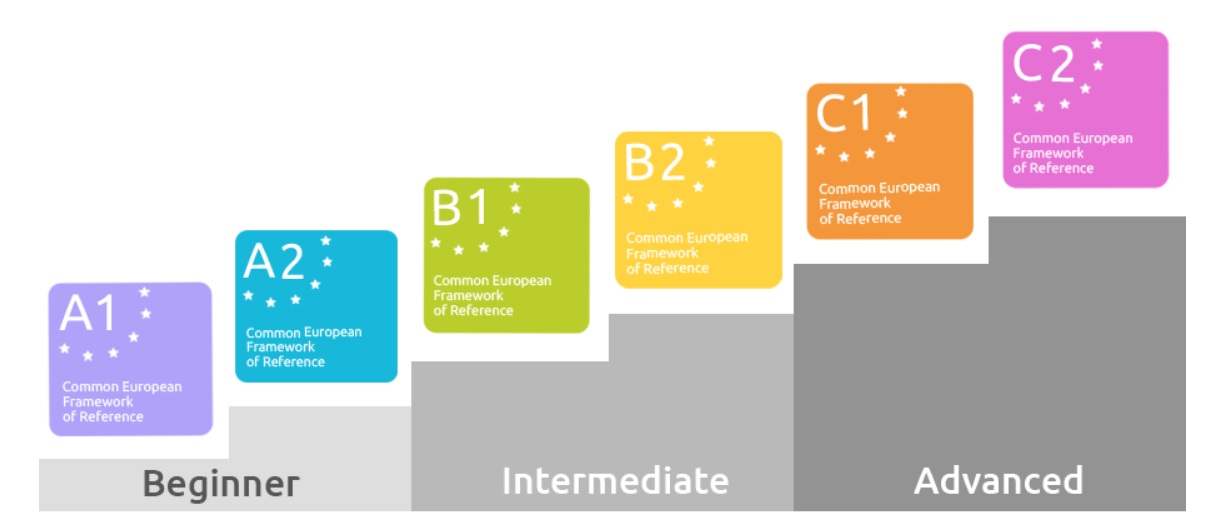Our courses are based on the Common European Framework of Reference for Languages (CEFRL).
Our pedagogical approach is learner-centered that encourages students to actively participate in their learning process and to reflect upon their progress. Every effort is made to help build self confidence in the student to facilitate the acquisition of the four language skills (listening, speaking, reading & writing).
The level you acquire is internationally recognized, a useful advantage should you be a full-time student or learning French for professional reasons.
Notably, as an adult, a teenager or a child, you are now able:
• easily transfer from one Alliance Française centre to another, owing to an internationally recognized standard for French language teaching and learning
• be aware of and better measure your degree of proficiency at all times, allowing you to write exams for international diplomas, tests and accredidations with confidence
• centre your language instruction around your personal and professional objectives
For each level, the objectives are set out in the Proficiency Scale of the Council using the four language skills (listening, speaking, reading and writing). Classroom situations correspond to the contexts in which students may find themselves in real life.

The French courses offered by the Alliance are structured to satisfy the Common European Framework for languages.
Courses offer
| Introductory course |
A1 |
Can recognize and use familiar words and simple phrases for concrete purposes. Can introduce himself or someone else. Can ask and answer basic questions about home, family, surroundings, etc. Can communicate in a basic way when the other person speaks slowly and clearly, and is ready to repeat or reformulate to help communication. | 130 hours |
| Elementary course |
A2 |
Can understand isolated phrases and common expressions that relate to areas of high personal relevance (like personal or family information, shopping, immediate environment, work). Can communicate during easy or habitual tasks requiring a basic and direct information exchange on familiar subjects. Using simple words, can describe his or her surroundings and communicate immediate needs. | + 140 hours |
| Intermediate course |
B1 |
Can understand the main points of clear standard speech on familiar subjects in work, school, leisure activities, etc. Can manage in most situations that come up when travelling in a region where the language is spoken. Can produce a simple and cohesive text on familiar subjects or subjects of personal interest. Can narrate an event, an experience or a dream; describe a desire or goal, and outline reasons or explanations behind a project or idea. | + 150 hours |
| Upper intermediate course |
B2 |
Can understand the main ideas of concrete or abstract topics in a complex text, including a technical article in the user’s area of expertise. Can communicate with a degree of spontaneity and fluency during a conversation with a native speaker, in a way that is comfortable for everyone. Can speak in a clear, detailed way on a number of subjects; express an opinion on current affairs, giving the advantages and disadvantages of the various options. | + 200 hours |
| Advanced course |
C1 |
Can understand a wide range of long and complex texts, including any subtextual or stylistic nuances. Can express him or herself freely and fluidly, without obviously fumbling for words. Can use the language effectively and fluently in a social, professional or academic context. Can speak in a clear, organised way about complex subjects, developing a well-structured argument. | + 200 hours |
| Master or Proficient |
C2 |
Can effortlessly understand almost everything he or she reads or hears. Capable of a coherent summary of events or arguments from oral or written sources. Can express him or herself precisely in a spontaneous, fluent way, conveying finer shades of meaning precisely. | + 200 hours |
